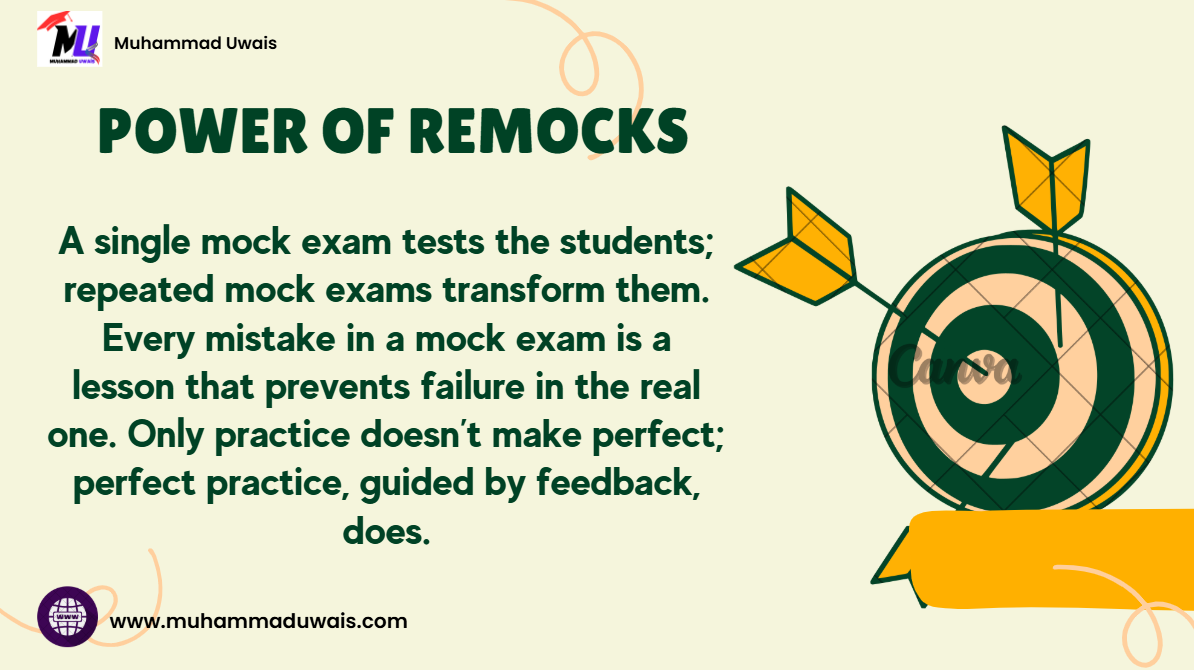Introduction
Mock exams are a crucial part of academic assessment, providing students with an opportunity to experience exam conditions, evaluate their performance, and identify areas for improvement. However, a single mock exam may not be enough to fully prepare students for their final exams. Conducting multiple mock exams—also known as re-mocks—alongside detailed feedback can significantly enhance student learning and performance. This article explores the advantages of re-mock exams, the role of feedback in improving student outcomes, and the overall importance of this strategy.
The Concept of Re-Mock Exams
Re-mock exams involve creating new exam papers multiple times and assessing students repeatedly under exam conditions. Each new mock test helps students refine their knowledge, improve their exam-taking skills, and build confidence. Unlike a one-time mock exam, re-mocks provide a continuous cycle of learning, assessment, and improvement, ensuring that students are well-prepared for their final exams.
By exposing students to different variations of questions, they develop the ability to think critically, adapt to different question styles, and effectively manage their time during exams. Re-mocks also simulate real exam pressure, enabling students to build resilience and improve their ability to perform under stress. The key benefit is not just about repeating the assessment but ensuring that each new exam provides a fresh challenge that contributes to their overall preparedness.
Advantages of Conducting Re-Mock Exams
- Enhanced Exam Readiness
- Re-mock exams simulate real exam conditions multiple times, helping students become comfortable with time constraints, question formats, and exam pressure. By sitting multiple exams, they experience a variety of question styles and difficulty levels, which prepares them for unexpected challenges in the final exam.
- Identifying and Addressing Weaknesses
- Each mock test highlights different weaknesses, allowing students to work on specific areas where they struggle. Over multiple attempts, they can systematically eliminate errors and strengthen their knowledge. Students also become more aware of recurring mistakes, allowing them to develop better test-taking strategies and refine their answers.
- Improving Time Management
- Practicing multiple mock exams enables students to manage their time more effectively, reducing the risk of running out of time in the actual exam. They learn how to allocate time wisely across different sections, improving their ability to complete the exam within the given timeframe.
- Boosting Confidence and Reducing Anxiety
- Regular exposure to exam-style questions and conditions helps students build confidence, reducing exam-related stress and improving overall performance. Many students feel overwhelmed before an exam, but familiarity with the format and repeated practice reduces anxiety and enhances their ability to stay composed during the actual test.
- Encouraging Consistent Learning
- Instead of last-minute cramming, re-mock exams encourage a structured study routine, ensuring continuous engagement with the subject matter. This long-term approach fosters deeper understanding and retention of knowledge, leading to better academic performance.
- Enhancing Retention and Understanding
- Repeated exposure to key concepts through different question patterns reinforces learning and improves long-term retention. The brain retains information better when reviewed multiple times in various formats, making re-mock exams an excellent strategy for mastering difficult subjects.
- Developing Exam-Taking Strategies
- Each new mock exam teaches students how to approach questions more efficiently, recognize patterns, and eliminate incorrect answers. This skill is particularly valuable in multiple-choice questions and complex problem-solving scenarios where strategic thinking is required.
The Importance of Feedback in Re-Mock Exams
While re-mock exams are valuable, their effectiveness significantly increases when coupled with constructive feedback. Feedback provides students with clear insights into their mistakes and guides them on how to improve.
Key Elements of Effective Feedback:
- Highlighting Errors – Identifying specific mistakes in answers helps students understand where they went wrong. It is important that students recognize both conceptual and technical errors so they can take corrective actions.
- Providing Suggestions for Improvement – Giving strategies and techniques to tackle similar questions better in the future. Instead of just pointing out mistakes, feedback should offer actionable steps that students can follow to improve their responses.
- Encouraging Self-Reflection – Students should analyze their mistakes and develop a plan to avoid repeating them. Teachers can prompt students to ask themselves what they could have done differently and encourage them to take ownership of their learning process.
- Recognizing Strengths – Acknowledging well-attempted sections to boost confidence and reinforce good practices. Students should be made aware of what they did correctly so they can replicate those strategies in future exams.
- Personalized Feedback – Addressing individual student weaknesses ensures targeted improvement. Generalized feedback may not be as effective as specific, tailored comments that focus on each student’s unique challenges.
- Providing Encouragement and Motivation – Feedback should be constructive, not discouraging. A positive approach helps students stay motivated and committed to their improvement.
Continuous Improvement Through Iteration
Each cycle of re-mock exams followed by feedback creates a loop of continuous learning and improvement. As students attempt new mock exams, they apply feedback from previous attempts, gradually refining their answers, improving accuracy, and developing better problem-solving strategies. The iterative nature of this process makes learning a journey of progressive enhancement rather than a one-time evaluation.
Furthermore, conducting re-mock exams with varied question formats—such as essay-based, multiple-choice, and scenario-based questions—ensures that students develop a well-rounded understanding of the subject. The exposure to different question styles makes them adaptable, increasing their chances of excelling in diverse exam settings.
Conclusion
Conducting multiple mock exams (re-mocks) along with structured feedback is a powerful strategy to maximize student learning. It not only helps students identify weaknesses but also provides opportunities for systematic improvement. The iterative process of assessment and feedback ensures that students gain confidence, enhance their knowledge retention, and perform better in their final exams. Schools and educators should incorporate re-mocks as a standard practice to prepare students effectively and optimize their academic success.
By creating a learning environment where assessment is continuous and improvement is emphasized, students develop a growth mindset. This approach not only prepares them for exams but also fosters critical thinking, resilience, and lifelong learning skills—essential qualities for success in any field.



